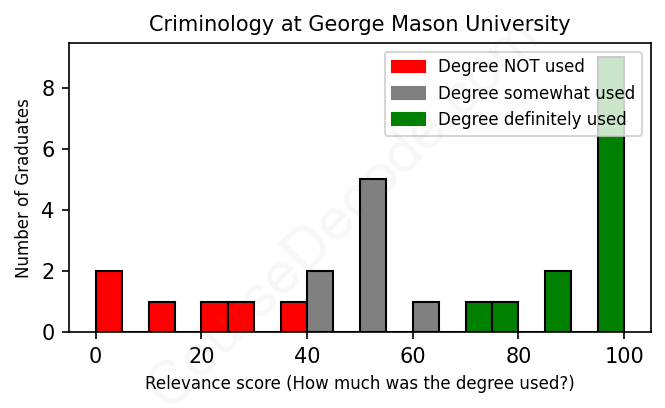
First, some facts. Of the Criminology graduates from George Mason University we've analyzed , here's how many have used (or NOT used) their degree in their career:

These are estimates based on AI analysis of 27 LinkedIn profiles (see below).
The verdict? Slightly below average. Overall, with an average relevance score of 63%, Criminology graduates from George Mason University have a slightly lower likelihood (-4%) of finding work in this field compared to the average graduate across all fields:
And for comparison, here's the chart for all profiles we've looked at across all degrees.
Also, after graduating, only 29% of these graduates have pursued further education other than another Bachelor's degree (such as a Masters degree or other), compared to the average across all profiles of 35%. This suggests a Bachelors degree is enough for most Criminology graduates, and it's normal to look for work straight after graduation.
See the details:
|
Relevance score: 3% We think this person has NOT gone into a career related to their degree. We think this person has NOT gone into a career related to their degree.
DEGREE INFOGraduated in 2020 from George Mason University with a Bachelor's of Science degree in Criminology. No other secondary education since. JOB HISTORY SINCE GRADUATIONBusiness Operations Manager Integrated Medical Physics, LLC Nov 2020 - Apr 2021 Pricing Associate  SAIC Apr 2021 - Present Pricing Analyst  SAIC Dec 2022 - Present ABOUTSkilled in Communication, Time Management, Teamwork, Leadership, and First Aid. Strong community and social services professional with a Bachelor's of Science degree focused in Criminology from George Mason University. |
The top 10 most common jobs done by the graduates we've analyzed (ranked most common to least) are:
When looking at what people with a Criminology degree from George Mason University have gone on to do, there’s a bit of a mixed bag. A lot of them have ended up in roles that aren't directly related to criminology, like working as servers, veterinary assistants, or in IT positions. Many folks took jobs in consulting and business analysis, which, while they might involve some problem-solving skills related to criminology, generally don’t require a deep understanding of criminal justice principles. It’s interesting to see that even within companies focused on security or risk management, like Booz Allen Hamilton, not all roles utilize criminology knowledge daily.
On the other hand, there are definitely some standout roles where the relevance of a criminology background shines through. For instance, positions like Police Officer, Case Managers at domestic violence shelters, and even roles in the National Center for Missing & Exploited Children directly apply criminology principles. Many graduates have also found themselves in various supportive roles within law enforcement and community services, which demand a solid grasp of what they studied. While it’s clear that a criminology degree can lay the groundwork for a range of careers, not everyone appears to be fully tapping into that training, especially in more corporate environments. So, it seems like if you're set on using criminology in your career, aiming for the justice or public service sectors might be your best bet!
Here is a visual representation of the most common words in job titles for Criminology graduates (this is across all Criminology graduates we've analyzed, not just those who went to George Mason University):

Looking at the career paths of Criminology graduates from George Mason University, it seems like there's a mix of practical roles, especially in the initial years after graduation. Many graduates take on first jobs that are not directly related to Criminology, such as administrative roles, security positions, or even customer service jobs. For instance, some started as servers or veterinary assistants, which indicates that they may have needed to take jobs that were more accessible at the beginning. However, a noticeable trend is that over time, many of these individuals transition into roles that align more closely with their degree. By the five to ten-year mark, we see a significant number moving into fields such as behavioral health, law enforcement, and criminal analysis, suggesting that while they may not have immediately landed in their desired field, they found their way back to it as they gained experience and networked effectively.
It's also worth pointing out that some graduates have done really well, advancing into senior analyst positions or consulting roles within reputable organizations like Booz Allen Hamilton, which is impressive! On the flip side, some took a little longer to find their niche, with diverse roles in IT or unrelated sectors. The overall picture portrays a somewhat typical trajectory for college graduates—initially diversifying into various jobs before honing in on their career passions as they gain experience. It appears that while not all immediate post-graduation jobs align with Criminology, graduates tend to find meaningful and relevant careers as they progress in their professional journeys.
Honestly, a Bachelor’s degree in Criminology, whether at George Mason University or elsewhere, can be a bit of a mixed bag when it comes to difficulty. It’s definitely not the easiest degree out there, but it’s also not the hardest. You’ll dive into a lot of interesting topics like criminal behavior, the justice system, and social issues, which can be pretty engaging. That said, there will be research papers, readings, and maybe some stats work that can get a little challenging. If you’re passionate about the subject, though, it can feel more doable. Ultimately, if you stay on top of your coursework and manage your time well, you should find it manageable!
Most commonly, in the LinkedIn profiles we've looked at, it takes people 4 years to finish a Bachelor degree in Criminology.
Alright, so looking at these George Mason grads and their jobs, it seems like there’s a mix of earnings across the board. Some have landed solid roles at established companies like Booz Allen Hamilton and government agencies, which typically pay better than average, especially as they move up to senior or consultant positions. On the flip side, we see folks starting off as servers or in various lower-paying positions, like security, which don’t really stack up as well financially. Overall, while some grads are likely making decent money, especially those in tech or government roles, others have taken paths that might not lead to the best salaries right away. It’s kind of a mixed bag, depending on the field they chose and how quickly they leveled up.
Here is a visual representation of the most common words seen in the "about" section of LinkedIn profiles who have a Bachelor degree in Criminology (this is across all Criminology graduates we've analyzed, not just those who went to George Mason University). This may or may not be useful:

Here are all colleges offering a Bachelor degree in Criminology (ordered by the average relevance score of their Criminology graduates, best to worst) where we have analyzed at least 10 of their graduates:
| College | Score | Count |
|---|---|---|
 California State University, Fresno California State University, Fresno
|
67 | 20 |
 George Mason University George Mason University
|
63 | 27 |
 Arizona State University Arizona State University
|
58 | 17 |
 Missouri State University Missouri State University
|
57 | 11 |
 The Ohio State University The Ohio State University
|
56 | 16 |
 Penn State University Penn State University
|
55 | 16 |
 Florida State University Florida State University
|
54 | 60 |
 West Virginia University West Virginia University
|
51 | 20 |
 University of Maryland University of Maryland
|
51 | 11 |
 John Jay College (CUNY) John Jay College (CUNY)
|
50 | 21 |
 University of South Florida University of South Florida
|
49 | 47 |
 Central Connecticut State University Central Connecticut State University
|
49 | 13 |
 University of Florida University of Florida
|
48 | 21 |
 The University of Texas at Dallas The University of Texas at Dallas
|
48 | 10 |
 Indiana University of Pennsylvania Indiana University of Pennsylvania
|
48 | 20 |
 Mississippi State University Mississippi State University
|
46 | 10 |